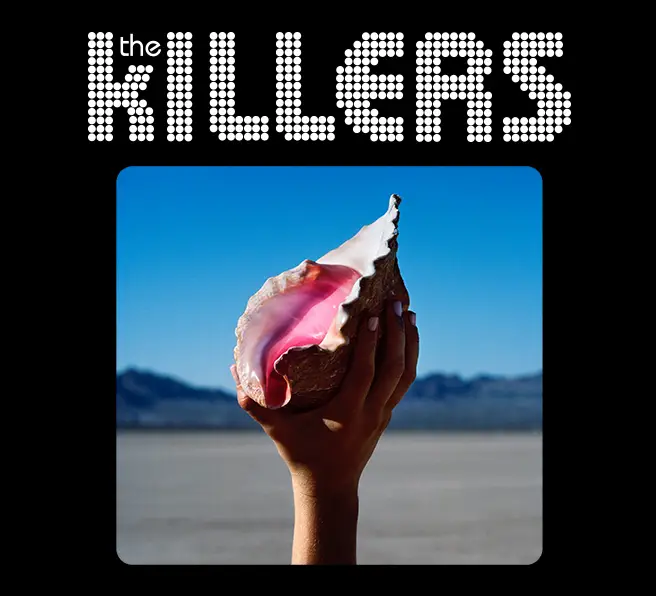Since the release of “Hot Fuss” and its smash singles “Mr. Brightside,” “All These Things That I’ve Done” and “Somebody Told Me” in 2004, The Killers have enjoyed massive recognition as a result of the songs’ long-lasting popularity. The explosive success of “Hot Fuss” is in part due to the surge of popularity of other post-punk groups during the same time, such as the Yeah Yeah Yeahs, the White Stripes and Interpol.
The infant years of the aughts were a great time for rock bands that sought to bring back the heyday of new wave to a new audience. The sounds of this era are unmistakable: dominant guitar and cymbals, flairs of synth and something lo-fi in the vocals. The Killers, by and large, have stuck to this sonic formula, but as tastes in popular music have turned over, the rock outfit has been left by the wayside. “Wonderful Wonderful” reminds listeners that The Killers are a forgotten novelty, but, nonetheless, one that still holds our attention.

While some of their contemporaries have undergone forms of reinvention, The Killers have stuck to their tried-and-true selves. Many of their lyrics are concerned with the attachment to a lover and the wish to escape with them. There’s an essence of longing for freedom across their discography, which often takes figurative shape as a “Juliet.” “Out Of My Mind” references Shakespeare’s play—“I can’t stand another chorus / About Juliet’s control over mystified mankind”—which The Killers have done before, as a cover of Dire Straits’ “Romeo and Juliet” from “Sawdust.” Since the recycled metaphor doesn’t add anything new to their already weak discography, it would appear as if The Killers seem intent on making the same mistakes.
Other rock groups, such as the Arctic Monkeys and Arcade Fire, have been met with acclaim after revitalizing their sound or changing their image, something The Killers have failed to do. Arctic Monkeys—the group behind “Whatever People Say I Am That’s What I’m Not” (2006) and “AM” (2013)—led by Alex Turner, went beyond indie garage rock to explore musical styles and compositions while maintaining their original charm. Arcade Fire took on theme after theme across their five albums, amping up the standard for musical complexity in rock and sidelining plenty of other acts.
Brandon Flowers and company seemed poised to flip the script in their lead single “The Man.” From the encroaching synth that bursts into the bassline and ambient vocals, “The Man” doesn’t open like a traditional Killers song. Even the lyrics evoke a character that is self-assured and confident: “When it comes to Friday, I always earn / Don’t try to teach me, I got nothing to learn.” The tinges of synth at the end of each line of the chorus are more pop than new wave, demonstrating a wider range of technique. The rest of the lyrics are not only energetic, but also cliché and even campy, especially when Flowers implies that he is “USDA certified lean.” The track is fun, mindless radio fodder, yet manages to be fresh from a group that doesn’t usually play that way.
Since “The Man” demonstrates the group’s ability to experiment with genre, the staleness of the rest of “Wonderful Wonderful” is disappointing. The playfulness of “The Man” belies the stodginess of the rest of the album, which never finds itself. The opener, an eponymous track, is a quasi-art rock, experimental journey across five minutes, making it the longest track on the album. A minor-keyed bassline inches forth as various dissonant notes of guitar and synth jut in and out. The track is like a derivative Fugazi song from “The Argument” and neither offers nor challenges any conventions of art rock.
Following “Wonderful Wonderful” is “The Man,” which then leads to “Rut.” The track opens with autotuned vocals that serve as intro and outro, seemingly inspired by Kanye West’s vocals-as-instrument method that he popularized in the middle and late 2000s. The Killers are obviously taking hints from other acts that combined elements of hip-hop to reach new heights, but this brief nod pulls at the sum of this album. “Life to Come,” which follows “Rut,” reels back into roots of pure rock. The track builds and builds before exploding into expressive, loud vocals and guitar, like the progression of a U2 song. Up next is “Run For Cover,” which sprints forth with the hurried strumming and delivery of a pop-punk song. This marks the halfway point of the album.
At this point, there’s no discerning what “Wonderful Wonderful” is trying to accomplish. Sure, each track has different and disparate sonic elements, providing a varied listen, but the message behind most of the songs are fairly generic. “Run For Cover” rehashes the desire for freedom that is spread across countless rock songs, while “Rut” explains itself and frankly, so does “The Man.” The album doesn’t ask its listeners to consider large questions or delve into deep emotional lows and highs. Other albums with so many dense and varied musical stylings expend a lot of energy from audiences, but “Wonderful Wonderful” doesn’t pry—there’s nothing challenging.
Perhaps asking for complexity is too much—“Mr. Brightside” goes in if you choose to analyze the track or not. “Wonderful Wonderful” did recently hit number one on the Billboard 200 and also earn The Killers their fifth consecutive number one album in the United Kingdom, leading them to be the first foreign band to ever do so. The ever-present American cultural references from the Las Vegas natives probably help bolster sales abroad, but what can be said for the States? Are The Killers a guilty pleasure, a band that is never spoken of but still finds time to be heard? “Wonderful Wonderful” is by no means a masterpiece, but from Woody Harrelson’s monologue on “The Calling” to the hooks of guitar and synth across the album, something about The Killers pulls you in.“Wonderful Wonderful” is double-edged, saying a whole lot of nothing yet alluring in its style over substance approach—as long as someone is listening.

















